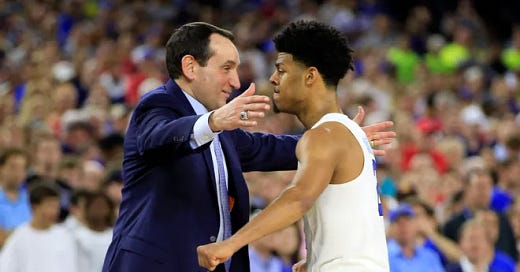Coaches and Class, Part 1: Which Side Are You On
If you listened to this week’s podcast (and if you haven’t, what are you doing with your time?), then you might have noticed an apparent contradiction in how I talked about various college basketball coaches. When discussing examples like Shaka Smart at Texas, or Will Wade at LSU, where the universities seemed eager to fire the coach, I referred to the coaches as labor, and said they were being mistreated by their bosses. But when discussing the abusiveness of Gregg Marshall or the racist language of Greg McDermott, I referred to them as management who should be opposed on behalf of the players. And while I acknowledge that my class analysis of the NCAA may not be precisely developed, I think the contradiction here reflects larger confusion about class, and that by looking at coaches in general, we can clear that confusion up.
Of course, college coaches are engaged in a particularly egregious type of exploitation. While they are paid generously, the players are not paid at all. In fact, coaches are often the most vocal opponents of paying college athletes. They claim that it would undermine the spirit of the game, when clearly what they are concerned about is player empowerment. College coaches have an enormous degree of power of their players, in large part because the players are unpaid.
Since college athletes are not technically employees, they have no union protection. On top of that, the coach has the ability to renew, or not renew, a scholarship, thereby controlling the player’s access to not just education, but potentially food and housing as well. This is how coaches like Gregg Marshall and Chris Doyle can get away with abusive behavior for so long. Players who were compensated fairly would not be so powerless, and so coaches have a clear incentive to advocate against the players’ interests.
College sports, in other words, presents a rather stark illustration of the way management can be made to mediate against the interests of workers. This happens even when there are sharp divides between coaches and ownership (or, in this case, the university). Coaches, after all, are not part of the ownership class—they have no material stake in the financial well-being of their universities. In fact, the relationship between coach and university can be quite contentious, as the Shaka Smart and Will Wade examples show; their employment can be precarious and their working conditions bad.
But even outside of those extreme examples, there is a general way in which coaches are closer to their players than their university. When we look at “the team” on the field or on the court, we see the players and the coaches—the athletic department, the staff, and the general manager seem a degree or two removed. Coaches certainly identify with players on a psychological level—you can hear this in the way coaches talk, using words like “we” and “us” to the refer to the players, but not the university as a whole. One of the beautiful things about sports is the bond that often exists between players and coaches.
So it can be tempting to categorize coaches with players as athletic labor. But it’s clear that, at least once the games end, their interests are not aligned. No matter how good they are to their players, college coaches are still benefitting from a system that relies on the exploitation of unpaid labor.
But let’s bracket the issue of pay for a moment. Let’s try to imagine a world where college athletes are paid for their labor. Or, better yet, let’s just look at professional sports. Are the class dynamics fundamentally different?
Not really. A coach is still a boss. Even when you add player salaries, a coach’s role is to oversee, discipline, and manage the work of players on behalf of ownership. No matter how much they may identify with their players, this identification is fundamentally paternalistic, and their loyalties are ultimately to the owners who hire them.
If this is starting to sound familiar, it is because we are dangerously close to having to talk about “the professional-managerial class.” Which, well… I think we’ll have to save that for another time.



